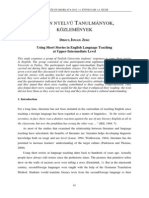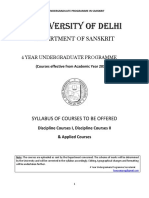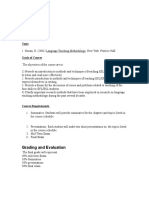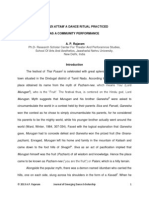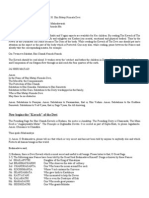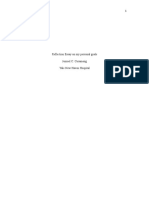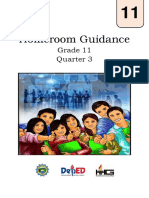University of Delhi: Four Year Undergraduate Programme
University of Delhi: Four Year Undergraduate Programme
Uploaded by
Naga RajCopyright:
Available Formats
University of Delhi: Four Year Undergraduate Programme
University of Delhi: Four Year Undergraduate Programme
Uploaded by
Naga RajOriginal Title
Copyright
Available Formats
Share this document
Did you find this document useful?
Is this content inappropriate?
Copyright:
Available Formats
University of Delhi: Four Year Undergraduate Programme
University of Delhi: Four Year Undergraduate Programme
Uploaded by
Naga RajCopyright:
Available Formats
FOUNDATIONCOURSE:LANGUAGE,LITERATURE,ANDCREATIVITYI(MODERNINDIANLANGUAGES ANDLITERARYSTUDIESTAMIL)
UNIVERSITY OF DELHI
FOUR YEAR UNDERGRADUATE PROGRAMME
(CourseseffectivefromAcademicYear201314)
SYLLABUSOFCOURSESTOBEOFFERED
FoundationCourse:Language,Literature,andCreativityI (ModernIndianLanguagesandLiteraryStudiesTamil)
Note: The courses are uploaded as sent by the Department concerned. The scheme of marks will be determined by the University and will be corrected in the syllabus accordingly. Editing, typographical changes and formatting will be undertaken further.
Four Year Undergraduate Programme Secretariat fouryearprog@gmail.com
FOUNDATIONCOURSE:LANGUAGE,LITERATURE,ANDCREATIVITYI(MODERNINDIANLANGUAGES ANDLITERARYSTUDIESTAMIL)
FOUNDATION COURSE Language, Literature and Creativity - I (Tamil) Course Outline This course has twofold aims of teaching and learning with a set of objectives related to the contemporary issues and grand challenges of nation. The primary aim of the course is to enable the student to recognize the grand challenges and contemporary issues of Indian society and to formulate various methods of resolving them through the knowledge gained through the study of literature in Tamil. The aim to study literary works is to enhance the language proficiency of students and to equip them in creative usage of language through analytical and critical study of literary works. It also aims to develop the ability of learners in classification and identification of various themes, forms, genres and narrative structures of literature in the process of creative reading, writing and interpretations which will strengthen the value and ethical commitments of learners. The creative and analytical skills of students in language and literature shall be correlated with the grand tasks of nation building and social construction. Grand Challenges: The grand challenges which India facing today are identified as follows: Economic Development, Rural and Urban linkages Energy and water Urbanization, Infrastructure, Transport, Sanitation Environment and Public Health Food security and Agriculture Education, Literacy Ethics, Society and Justice.
Every semester, teaching will be spread over 16 weeks including two weeks for review. Medium of Teaching and Examination: Tamil Medium of teaching and writing of examination of this course is Tamil. (The students studied Tamil as a language in school education up to VIII/X/XII std. are eligible to take this course.)
FOUNDATIONCOURSE:LANGUAGE,LITERATURE,ANDCREATIVITYI(MODERNINDIANLANGUAGES ANDLITERARYSTUDIESTAMIL)
Objectives of the Course: This course shall teach and train the students to: Use language in different situations and express their ideas on various themes and topics with precision. Respond to spoken language and other conversations with optimum listening skill. Express and speak confidently on a variety of topics and contents. Develop reading skills to read varied texts. Improve their writing skills in terms of expressing ideas/point of view and organizing thoughts with coherence and clarity. To appreciate different kinds of literary genres and expressions. Become creative in expression, thought and presentation. Write and present their project proposals and final reports. Organization of Teaching There are six units in the course speread over 14 weeks. There would be 56 teaching periods and 14 periods for students presentation in a semester and the total number of period will be 70 (56+14). The details of the Units / themes and their distribution of periods are given below. In addition two weeks for field work/ project work / trip related activity as required by the course curriculum will be given. Themes of Study: This study includes the following themes related to the grand challenges of our contemporary Indian society: Unit-1 Equality and Social Justice: Caste and the Problem of untouchability Gender Equality Unit-2: Environment and Public Health Ecological degradation: Land, water and air Health problems and Environment Unit-3: Urbanization and Migration Unemployment in Villages Migration and life in urban centers (10 Periods)
(10 Periods)
(10 Periods)
FOUNDATIONCOURSE:LANGUAGE,LITERATURE,ANDCREATIVITYI(MODERNINDIANLANGUAGES ANDLITERARYSTUDIESTAMIL)
Unit-4: Rural and Agrarian life Poverty in villages Child labour Female infanticide Unit-5: National Integration Cultural diversity and integration Unit -6: Education and Literacy Literacy for women Education in rural India Reading Materials:
(10 Periods)
(08 Periods)
(08 Periods)
The teaching and learning material includes the following texts and films related to the issues. The texts and films can be identified and added according to the need of the students along with the recommended reading materials. The teachers are free to select some other suitable texts related the contents. Unit: 1 Equality and Social Justice: 1. Article on E.V.R.Periyar by V.Anaimuthu 2. Ayotthithaasar: orukannottam by AnbuPonnoviyam in ayotthidaasar sinthanaikal-Vol1 Edited by Gnana. Aloysias 3. Kolai, Short Story by Vaasanthi 4. Elakkaaram, Short Story by Baamaa Unit: 2 Environment and Public health: 1.kadalpazhankudikal, Article by VareethiyaKonstatine (2012) 2. maasusoozhnthaukakam by R.N.Seshagiri , New Delhi:NBT Unit-3 Urbanization and Migration: 1. AnkaaditTheru (Film) 2. Veedu(Film) Unit-4 Rural and Agrarian Life: 1.ThanneerThaneer (Film/Play) 2.kathavu ,short Story by Ki.Rajanarayanan 3.karuppu rail by Konangi Unit-5: National Integration: FivePoemsof SubramaniyaBharathi
FOUNDATIONCOURSE:LANGUAGE,LITERATURE,ANDCREATIVITYI(MODERNINDIANLANGUAGES ANDLITERARYSTUDIESTAMIL)
Unit-6 Education and Literacy: 1. Penmakkalum (pp:29-39) andPenmakkalnilai (pp:50-54) by Thiru.Vi.Kalyanasundaram. 2. Karutthamma , Film Directed by Bharathiraja Supplementary Material Printed material Audio Visual CD and DVDs Films and Documentaries Websites and digital archives
Teaching, learning and interactive study: The class room activity is designed as a group discussion, dialogue, debate and consultancy on the related texts and film screenings. This integrated teaching method can improve the listening, speaking, reading and writing skills of the students and strengthen the vocabulary and application of grammar. The combined teaching will enlighten the students in understanding and addressing the issues and challenges. ASSESSMENT The assessment of the students performance will be through: (i) Continuous evaluation of Project work (35 marks) (ii) End Semester written examination (40 marks) End-semester written examination: The testing will not be necessarily dependent on any prescribed text. Test items related to Themes of Study and language skill Test items on vocabulary expression, grammar and writing. The students will be assessed on their ability to express their ideas and in error free language usage. Writing on larger issues. Project Work: The project work is based on the skills of students in creative writing on a select theme. This can be extended to rewriting, adaptation, retelling and change of narrative format.
FOUNDATIONCOURSE:LANGUAGE,LITERATURE,ANDCREATIVITYI(MODERNINDIANLANGUAGES ANDLITERARYSTUDIESTAMIL)
-A student can write a short story, one act play, conversation and dialogue, reportage and an essay on a theme by their choice. A student can prepare a paper of appreciation, evolution and analysis of a select literary work and film on social issues. Topics of Project: Topics for Project work shall be related to the themes of study and other issues related to the contemporary society as identified in the course structure. The topics shall be suitable to facilitate the students to involve their language skills and creative spirit. The format of project work can follow any one of the genres learned in the course. The student shall be given a choice of selection of the Project in the beginning of semester. Topics identified for Project work: 1. 2 3. 4. 5. 6. 7. 8. 9. 10. 11. 12. 14. Development of Tamil language/script/literature. Festivals of Tamils. Use of traditional medicines by the Tamil community Attitude of Tamil speakers towards their language. Mapping of Tamil culture (on a particular event from the culture) Usage of Tamil language in media, films and cyber world. The life and works of a creative writer in Tamil Any performing tradition of Tamil (dance, drama, music, traditional game etc.). Contemporary social issues/challenges. Tamil language in the 21st century. Retelling/rewriting of a narrative. Critical evaluation of a text, in any form, of Tamils literature. Tourist places in Tamil Nadu
Reading List: Aloysias, Gnana. (Ed.). (1999). Ayotthidaasar Sinthanaikal (Vol.1), Palayamkottai: Folklore Resource and Research Centre, pp.xxiii-xlv Anaimuthu,V. (Ed.), (1975). Periyar E.V.R. Cinthanaikal, (Vol-I), Tiruchirappalli: Cinthanaiyalarkalaga, pp. xviii-lxxix Ithayavendan, Vizhi. Pa. (Ed.). (2000). elakkaram in Dalit Cirukathaikal, Chennai: Kaavya. pp.51-59
FOUNDATIONCOURSE:LANGUAGE,LITERATURE,ANDCREATIVITYI(MODERNINDIANLANGUAGES ANDLITERARYSTUDIESTAMIL)
Kalyanasundaram,Thiru.Vi. (2004). TamilcholaiAllathuKatturaithirattu, Chennai:PumpukarPirasuram. pp. 29-39 and 50-54 Konangi. (1987). karuppurail in Mathinimarkalkathai , Sivagangai: Annam. pp.28-35 Rajanarayanan, Ki. (1965). katavu in Katavu, Sivagangai: Akaram. pp. 5-13 Ramakrishnan. E.V. (Ed.) kolai in Indiya-c-Cirukataikal, Translated into Tamil by Prem, New Delhi: Sahitya Akademi.. pp.493-508., Seshagiri. R. N. (1991), Maasusoozhnthaulakam, New Delhi:NBT Subramaniya Bharathi, (2011). BharathiyarKavithaikal, Chennai: Narmada Pub. pp.18- 50 VareethiyaKonstatine, 2012, kadalpazhankudikal Anniyappadum Kadal, Chennai: Kilaikkarru. pp.5-17
You might also like
- 2015 CV WeeblyDocument8 pages2015 CV Weeblyapi-260961368No ratings yet
- Teaching Portfolio - Overview ScribdDocument8 pagesTeaching Portfolio - Overview Scribdapi-260961368No ratings yet
- English Masters Syllabus WBSU 2022Document38 pagesEnglish Masters Syllabus WBSU 2022Sahil DeNo ratings yet
- Foundation Course - Indian Literature - EnglishDocument5 pagesFoundation Course - Indian Literature - EnglishaniruddhankNo ratings yet
- LiteratureDocument6 pagesLiteraturerayan.azeezNo ratings yet
- LL HL EricDocument5 pagesLL HL Ericapi-31417059No ratings yet
- Genre-Based ApproachDocument23 pagesGenre-Based ApproachNa Dina67% (3)
- Adv SyllabusDocument46 pagesAdv SyllabusMiao MiaoNo ratings yet
- Teacher edition-EEN 4102 - REV 2017-18Document2 pagesTeacher edition-EEN 4102 - REV 2017-18Parbattie DannyNo ratings yet
- Teaching Literary Texts Lecture ThreeDocument16 pagesTeaching Literary Texts Lecture ThreeSa LiNo ratings yet
- Approaches To Teaching Literature: Module 3Document9 pagesApproaches To Teaching Literature: Module 3Dayana Fe ManatadNo ratings yet
- ENG4UPDocument46 pagesENG4UPTimothy CNo ratings yet
- Using Short Stories in English Language Teaching at Upper-Intermediate LevelDocument11 pagesUsing Short Stories in English Language Teaching at Upper-Intermediate Levelİsmail Zeki Dikici0% (2)
- Doctors of Arts in Language TeachingDocument8 pagesDoctors of Arts in Language TeachingHao Li MinNo ratings yet
- Language and CultureDocument3 pagesLanguage and CultureAryanNo ratings yet
- Reserach PPR AssgnDocument10 pagesReserach PPR Assgnjatin chughNo ratings yet
- IB French SL - HL SylabusDocument9 pagesIB French SL - HL SylabusManal Doukh100% (1)
- ASE 241 Course OutlinesDocument2 pagesASE 241 Course OutlinesAbioye OpeyemiNo ratings yet
- Syllabus of B.A in Sanskrit DU FyupDocument77 pagesSyllabus of B.A in Sanskrit DU Fyupsunder27No ratings yet
- Full ArtikelDocument10 pagesFull ArtikelMohd Zahren ZakariaNo ratings yet
- English For Specific PurposesDocument9 pagesEnglish For Specific PurposesjennymontNo ratings yet
- Teaching LiteratureDocument33 pagesTeaching LiteratureMaria Pacer Gorobao100% (1)
- Why Should Literature Be Used in The Language Classroom?: Nina Daskalovska, Violeta DimovaDocument5 pagesWhy Should Literature Be Used in The Language Classroom?: Nina Daskalovska, Violeta DimovaFathi MusaNo ratings yet
- Teaching Literature 2016Document4 pagesTeaching Literature 2016Imadeddin100% (1)
- Eld121 - Revision and Exam Prep.Document15 pagesEld121 - Revision and Exam Prep.lifamabuza307No ratings yet
- Proposal ResearchDocument31 pagesProposal ResearchYeccy AjjhaNo ratings yet
- 2016ArtonMultimodalityAEJ TA 94 August 2016Document55 pages2016ArtonMultimodalityAEJ TA 94 August 2016hail jackbamNo ratings yet
- Literature Learning in The Malaysian Esl Classroom: A Uitm ExperienceDocument8 pagesLiterature Learning in The Malaysian Esl Classroom: A Uitm ExperienceShakeel J MalikNo ratings yet
- GE-V Language and Culture SyllabusDocument3 pagesGE-V Language and Culture SyllabusBhanu Prakash ReddyNo ratings yet
- 2 Langabinitiosl PDFDocument2 pages2 Langabinitiosl PDFEdson DornelesNo ratings yet
- Information Regarding LiteratureDocument4 pagesInformation Regarding LiteratureCassandra MartinNo ratings yet
- Unit 6 (Weeks 13-16) : Introduction To Poetry Fora9 Grade English Language Arts ClassroomDocument55 pagesUnit 6 (Weeks 13-16) : Introduction To Poetry Fora9 Grade English Language Arts Classroomapi-317392151100% (1)
- Teaching of SanskritDocument2 pagesTeaching of SanskritBineet Kumar100% (2)
- Genre BasedTeachingDocument14 pagesGenre BasedTeachingJocelyn De Sagun ChavezNo ratings yet
- English Ib StandardsDocument8 pagesEnglish Ib Standardsapi-232330265No ratings yet
- Lgalvan@unicolombo - Edu.co: Fundación Universitaria UnicolomboDocument3 pagesLgalvan@unicolombo - Edu.co: Fundación Universitaria UnicolomboLuisa BlancoNo ratings yet
- Poetryunit 2-24final PDFDocument129 pagesPoetryunit 2-24final PDFRobert Robinson100% (1)
- IB Lang and Lit Yr 2 SyllabusDocument10 pagesIB Lang and Lit Yr 2 SyllabusHunter GaleNo ratings yet
- Significance of Teaching Literature in The EFL Classroom: December 2018Document7 pagesSignificance of Teaching Literature in The EFL Classroom: December 2018Tahar RechidiNo ratings yet
- Problems of Studying English in The UG Colleges of Assam, India With Special References To The Colleges of Dhubri District.Document13 pagesProblems of Studying English in The UG Colleges of Assam, India With Special References To The Colleges of Dhubri District.Mr. Indranil Sarkar M.ANo ratings yet
- Language in Society - Syllabus 2016 PDFDocument6 pagesLanguage in Society - Syllabus 2016 PDFRyan Lala Rangga SenjayaNo ratings yet
- Using Short Stories To Teach Language Skills: February 2011Document15 pagesUsing Short Stories To Teach Language Skills: February 2011masyitah230300No ratings yet
- Course OutlineDocument5 pagesCourse OutlineRobert TsuiNo ratings yet
- English Language A Literature Subject Outline 5.2013 DLDocument8 pagesEnglish Language A Literature Subject Outline 5.2013 DLJoan FlynnNo ratings yet
- Daily Lesson Plan Template: in MinutesDocument6 pagesDaily Lesson Plan Template: in Minutesapi-524452731No ratings yet
- Unit Plan Overview Update 2Document13 pagesUnit Plan Overview Update 2api-253684040No ratings yet
- Example 18 Yr 9 Lote 3 1Document5 pagesExample 18 Yr 9 Lote 3 1zeinab15No ratings yet
- Syllabus in Applied LinguisticsDocument6 pagesSyllabus in Applied LinguisticsGlennmeloveNo ratings yet
- 1-13 SyamsiaDocument13 pages1-13 SyamsiaDina ImaniaNo ratings yet
- Teaching WritingDocument12 pagesTeaching WritingKeebeek S ArbasNo ratings yet
- Edu 313 Integrated Language ArtsDocument89 pagesEdu 313 Integrated Language ArtsAdishat Aminah AnikeNo ratings yet
- Using Literary Texts in Language Teaching: Nguyen Thi Thom ThomDocument7 pagesUsing Literary Texts in Language Teaching: Nguyen Thi Thom ThomdfNo ratings yet
- Language Culture and Society Course Outline Postgraduate 2021 Applied LinguisticsDocument6 pagesLanguage Culture and Society Course Outline Postgraduate 2021 Applied LinguisticsLiễu LêNo ratings yet
- Pedagogical Stylistic Analysis of Qasira Shahraz S A Pair of JeansDocument12 pagesPedagogical Stylistic Analysis of Qasira Shahraz S A Pair of JeansKha OulaNo ratings yet
- Grading and Evaluation: TextsDocument3 pagesGrading and Evaluation: Textshuda1984No ratings yet
- The Use of Poetry To Raise InterculturalDocument15 pagesThe Use of Poetry To Raise InterculturalkalynnlorenzoNo ratings yet
- To Infinity and Beyond Lesson TemplateDocument4 pagesTo Infinity and Beyond Lesson Templateapi-266921998No ratings yet
- HS31076 SyllabusDocument9 pagesHS31076 SyllabusPRAVALLIKA VASADINo ratings yet
- Literature and Language TeachingDocument12 pagesLiterature and Language TeachingirinNo ratings yet
- Shivanataraja 1Document7 pagesShivanataraja 1Gray HoundyNo ratings yet
- Tamil SyllabusDocument51 pagesTamil Syllabusvikkikokki50% (4)
- Manual Under Section 4 (1) (B) of The Right To Information Act 2005Document50 pagesManual Under Section 4 (1) (B) of The Right To Information Act 2005Naga RajNo ratings yet
- CuckooDocument71 pagesCuckooNaga RajNo ratings yet
- Cricket 101Document1 pageCricket 101rumioceanNo ratings yet
- Sanskrit, Hindi, Tamil, Gujarati, Telugu, Marathi, Vedic Mathematics, Arts and Bharatnatyam ClassesDocument2 pagesSanskrit, Hindi, Tamil, Gujarati, Telugu, Marathi, Vedic Mathematics, Arts and Bharatnatyam ClassesNaga RajNo ratings yet
- Kavadi Attam A Dance RitualDocument23 pagesKavadi Attam A Dance RitualNaga RajNo ratings yet
- BMus MMus DipDocument67 pagesBMus MMus Dipdotknow100% (1)
- 4 Aswini MishraDocument35 pages4 Aswini MishraNaga RajNo ratings yet
- Section 5 More DevelopedDocument2 pagesSection 5 More DevelopedNaga RajNo ratings yet
- Final Report ON 20 Years Perspective Tourism Plan FOR The State of Tamil NaduDocument237 pagesFinal Report ON 20 Years Perspective Tourism Plan FOR The State of Tamil NaduSantosh SharmaNo ratings yet
- BMus MMus DipDocument67 pagesBMus MMus Dipdotknow100% (1)
- Kavach of The Devi - Sahaja YogaDocument3 pagesKavach of The Devi - Sahaja YogaNaga Raj100% (1)
- Directory ProgComDocument182 pagesDirectory ProgComNaga RajNo ratings yet
- SECOWW Plantation 200809Document86 pagesSECOWW Plantation 200809Naga RajNo ratings yet
- VillupuramDocument21 pagesVillupuramNaga Raj100% (1)
- UNIT I ModuleDocument7 pagesUNIT I Modulechristine RamosNo ratings yet
- 5f ArtifactDocument6 pages5f Artifactapi-336449006No ratings yet
- 12b Combinations - H - Mark SchemeDocument4 pages12b Combinations - H - Mark SchemeAbhinNo ratings yet
- Annual Partners RMDocument9 pagesAnnual Partners RMNoahSamNo ratings yet
- Making Histories in Museums 1996 PDFDocument302 pagesMaking Histories in Museums 1996 PDFCatarina Pinto50% (2)
- Laboratory Activities To Introduce CarboDocument5 pagesLaboratory Activities To Introduce CarboTiara Ayu F HNo ratings yet
- Reflection Essay On My Personal GoalsDocument3 pagesReflection Essay On My Personal GoalsJemuel CuramengNo ratings yet
- 1375414913-Session01 Basics of CDocument38 pages1375414913-Session01 Basics of CMAryaKumarNo ratings yet
- Chapter 4Document9 pagesChapter 4Loraine PlatillaNo ratings yet
- Guru Gobind Singh Indraprastha University (Ggsipu) PET/CET CBT HELD ON 10th October 2021Document9 pagesGuru Gobind Singh Indraprastha University (Ggsipu) PET/CET CBT HELD ON 10th October 2021ρυикιl яαgнυναиѕнιNo ratings yet
- Do You Feel It TooDocument386 pagesDo You Feel It TooPaolaSánchezNo ratings yet
- TOEIC Answer-SheetDocument1 pageTOEIC Answer-Sheethamtaro100% (10)
- A Retrospective On SSP 2004: A Two-Month Space Program Held in Adelaide, AustraliaDocument10 pagesA Retrospective On SSP 2004: A Two-Month Space Program Held in Adelaide, Australiaapi-27157299No ratings yet
- Nhs FPX 4000 Assessment 4 Analyzing A Current Health Care Problem or IssueDocument6 pagesNhs FPX 4000 Assessment 4 Analyzing A Current Health Care Problem or IssueCarolyn HarkerNo ratings yet
- SportsDocument3 pagesSportsfláviaNo ratings yet
- Your Suggested Topics-Cbp 2024Document13 pagesYour Suggested Topics-Cbp 2024shivanshmohapatra248No ratings yet
- English Sample QuesrtionsDocument17 pagesEnglish Sample QuesrtionsCathy Shandy AlmoceraNo ratings yet
- Module ResearchDocument6 pagesModule Researchlyra colladoNo ratings yet
- Reading Year 8 Lesson PlanDocument7 pagesReading Year 8 Lesson Planapi-285385473100% (1)
- Robot Incentives ScaleDocument3 pagesRobot Incentives ScaleSanam PuriNo ratings yet
- Homeroom Guidance: Grade 11 Quarter 3Document8 pagesHomeroom Guidance: Grade 11 Quarter 3Neil Mhartin Napoles100% (1)
- Bike RidersDocument2 pagesBike RidershappyNo ratings yet
- StEDE Introduction Dec 2016 V3Document20 pagesStEDE Introduction Dec 2016 V3Ngọc Thảo LeeNo ratings yet
- Math 7 Plus Unit 2 OverviewDocument2 pagesMath 7 Plus Unit 2 Overviewapi-314307886No ratings yet
- Gen Ed 008 STS Lesson 7 Science and Technology and Nation Building DaganasolRODocument45 pagesGen Ed 008 STS Lesson 7 Science and Technology and Nation Building DaganasolROquintanamarfrancisNo ratings yet
- LVHS 2012 Hall of Fame Mailer FinalDocument2 pagesLVHS 2012 Hall of Fame Mailer FinalJohn DoyleNo ratings yet
- Womens Month CelebrationDocument9 pagesWomens Month CelebrationJan Michael de AsisNo ratings yet
- Kingston University Personal Statement WorkbookDocument20 pagesKingston University Personal Statement WorkbooknurashenergyNo ratings yet
- My Language Competences EvaluationDocument3 pagesMy Language Competences Evaluationxsalah13No ratings yet
- Full Download The Adolescent Development Relationships and Culture 14th Edition Ebook PDFDocument42 pagesFull Download The Adolescent Development Relationships and Culture 14th Edition Ebook PDFbarbara.coakley466100% (52)












